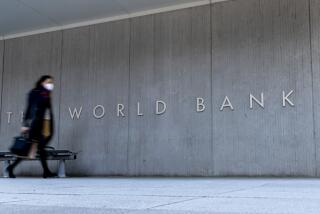World Bank Loses Its Way : Dubious policies have appeared in lending to poor nations
- Share via
With free markets and capitalism fueling change in the world today, poor countries have a harder time than ever competing for development funds. The most needy traditionally have depended on interest-free loans from institutions like the World Bank, but many of these countries, especially in Africa, are not getting adequate funding. Some rethinking on lending policies is in order at the World Bank.
Consider China and India, the two largest recipients of World Bank loans. As Times columnist Jim Mann pointed out last week, China received $925 billion in interest-free loans in 1994 from the bank’s International Development Assn., which is supposed to lend to countries so poor that they can’t get credit elsewhere. Well, China has foreign reserves of $70 billion and attracted more than $33 billion in foreign investment in 1994; per capita income, at $530 in 1994, was well above the world average of $382 for countries that receive IDA funds. With China on its way to fuller development, surely some of the money going there should be diverted to Africa, where per capita income is only $307 a year. Africa is the only continent where the number of poor is expected to rise in the next decade.
Too often, too conveniently, loans designed to relieve poverty reflect the political interests of the bank and its donor countries, which are led by the United States, Japan, Germany, France and Britain. China is a model of a poor country successfully following the World Bank’s recommendations for a capitalist-based economic policy, so the bank wants to continue funding China. Japan, with an eye on regional development, has been the strongest supporter of poverty loans to China. Some World Bank policies, Mann observed, hint of neocolonialism. For instance, London has persuasively argued against any early diminution of poverty loans to India, its former colony and the No. 1 recipient of World Bank loans in 1995. There are far needier countries in Africa, Eastern Europe and Central Asia. They deserve no-interest loans if poverty is the criterion, but they do not have high-profile champions in the lenders’ camp. The World Bank is supposed to be impartial, granting loans on a case-by-case basis. It seems to have lost sight of that.
More to Read
Sign up for Essential California
The most important California stories and recommendations in your inbox every morning.
You may occasionally receive promotional content from the Los Angeles Times.













